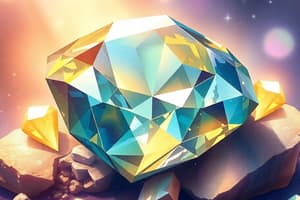Podcast
Questions and Answers
What does a moissanite tester measure?
What does a moissanite tester measure?
- Refractive index
- Thermal conductivity
- Electrical conductivity (correct)
- Dispersion levels
Which factor does NOT affect the results of thermal conductivity testing?
Which factor does NOT affect the results of thermal conductivity testing?
- Touching metals
- Temperature of the room
- Size of the stone
- Color of the stone (correct)
What is indicated if a black synthetic moissanite shows diamond on a thermal tester?
What is indicated if a black synthetic moissanite shows diamond on a thermal tester?
- It's definitely a diamond.
- It shows false thermal properties.
- It has high thermal conductivity. (correct)
- It has low thermal conductivity.
How can one examine the dispersion of a gemstone?
How can one examine the dispersion of a gemstone?
What happens during the doubling effect when observing a stone?
What happens during the doubling effect when observing a stone?
What characteristic of diamonds makes read through testing ineffective?
What characteristic of diamonds makes read through testing ineffective?
Which of the following explains why some simulants might be confused with diamonds?
Which of the following explains why some simulants might be confused with diamonds?
What is a common method for detecting gemstones that requires observing multiple directions?
What is a common method for detecting gemstones that requires observing multiple directions?
Which property do diamond simulants generally lack compared to natural diamonds?
Which property do diamond simulants generally lack compared to natural diamonds?
What is a key characteristic that distinguishes glass as a diamond simulant?
What is a key characteristic that distinguishes glass as a diamond simulant?
What process did Auguste Verneuil develop for creating synthetic diamond simulants?
What process did Auguste Verneuil develop for creating synthetic diamond simulants?
What term refers to stones that are backed with metal foil, but not all are simulants?
What term refers to stones that are backed with metal foil, but not all are simulants?
In testing diamond simulants, what aspect is often evaluated to determine their quality?
In testing diamond simulants, what aspect is often evaluated to determine their quality?
Which of the following diamond simulants was particularly popular in the 1990s?
Which of the following diamond simulants was particularly popular in the 1990s?
What happens to glass when lead oxide is added to it?
What happens to glass when lead oxide is added to it?
Which characteristic is not typically found in diamond simulants?
Which characteristic is not typically found in diamond simulants?
When were glass simulants primarily used in jewelry?
When were glass simulants primarily used in jewelry?
What feature do diamond simulants not consistently replicate?
What feature do diamond simulants not consistently replicate?
Which simulant is known to show a bright orange flash on its pavilion facets under darkfield lighting?
Which simulant is known to show a bright orange flash on its pavilion facets under darkfield lighting?
What is the term used to compare the size of an object to its weight, specifically for loose stones?
What is the term used to compare the size of an object to its weight, specifically for loose stones?
Which characteristic distinguishes diamond from other simulants, making it harder and able to achieve sharp facet junctions?
Which characteristic distinguishes diamond from other simulants, making it harder and able to achieve sharp facet junctions?
Why is the pavilion color flash test considered unreliable for certain types of stones?
Why is the pavilion color flash test considered unreliable for certain types of stones?
What is the specific gravity (SG) range of cubic zirconia (CZ)?
What is the specific gravity (SG) range of cubic zirconia (CZ)?
Which type of girdle appearance is common in modern diamonds compared to historical practices?
Which type of girdle appearance is common in modern diamonds compared to historical practices?
Which of the following inclusions is indicative of natural diamonds but absent in synthetic diamond simulants?
Which of the following inclusions is indicative of natural diamonds but absent in synthetic diamond simulants?
Which simulant is noted for having a specific gravity that is slightly lower than that of diamonds?
Which simulant is noted for having a specific gravity that is slightly lower than that of diamonds?
What type of luster can simulants achieve compared to the adamantine luster of diamonds?
What type of luster can simulants achieve compared to the adamantine luster of diamonds?
What is a common flaw seen in simulants due to their comparative softness compared to diamonds?
What is a common flaw seen in simulants due to their comparative softness compared to diamonds?
Which statement accurately describes a common feature of diamond simulants?
Which statement accurately describes a common feature of diamond simulants?
What is a correct approach when accepting jewelry for repair without knowing the material?
What is a correct approach when accepting jewelry for repair without knowing the material?
Which of the following simulants is known for being heavily promoted and commonly recognized?
Which of the following simulants is known for being heavily promoted and commonly recognized?
What characteristic should a jewelry professional exhibit to encourage clients interested in simulants?
What characteristic should a jewelry professional exhibit to encourage clients interested in simulants?
What is a significant risk when selling gems without accurate identification?
What is a significant risk when selling gems without accurate identification?
What property of CZ gives it a closer appearance to diamonds?
What property of CZ gives it a closer appearance to diamonds?
Which characteristic differentiates synthetic moissanite from CZ?
Which characteristic differentiates synthetic moissanite from CZ?
What is an important feature of assembled simulants?
What is an important feature of assembled simulants?
How can one easily detect garnet-and-glass doublets?
How can one easily detect garnet-and-glass doublets?
What distinguishes coated simulants from standard CZ or synthetic moissanite?
What distinguishes coated simulants from standard CZ or synthetic moissanite?
Which quality does synthetic moissanite possess in comparison to diamond?
Which quality does synthetic moissanite possess in comparison to diamond?
What aspect implies the low heft of synthetic moissanite?
What aspect implies the low heft of synthetic moissanite?
What makes color in CZ differ from natural colored diamonds?
What makes color in CZ differ from natural colored diamonds?
What is a major challenge in identifying synthetic moissanite?
What is a major challenge in identifying synthetic moissanite?
What is the typical Mohs scale rating for synthetic moissanite?
What is the typical Mohs scale rating for synthetic moissanite?
Flashcards
Thermal Conductivity Test
Thermal Conductivity Test
Measures how quickly a gem's surface temperature changes when heated.
Diamond Thermal Conductivity
Diamond Thermal Conductivity
Diamond's surface temperature changes quickly compared to most simulants.
Moissanite Electrical Conductivity
Moissanite Electrical Conductivity
Moissanite can conduct electricity; most diamonds do not.
Doubling Test
Doubling Test
Signup and view all the flashcards
Dispersion
Dispersion
Signup and view all the flashcards
Read-Through Test
Read-Through Test
Signup and view all the flashcards
Diamond Simulant
Diamond Simulant
Signup and view all the flashcards
Multi-Tester
Multi-Tester
Signup and view all the flashcards
Simulant's Properties
Simulant's Properties
Signup and view all the flashcards
Glass Simulants
Glass Simulants
Signup and view all the flashcards
Foilbacks
Foilbacks
Signup and view all the flashcards
Rhinestone
Rhinestone
Signup and view all the flashcards
Synthetic Sapphire/Spinel
Synthetic Sapphire/Spinel
Signup and view all the flashcards
Diamond Imitation History
Diamond Imitation History
Signup and view all the flashcards
Simulant Availability
Simulant Availability
Signup and view all the flashcards
Simulant Use
Simulant Use
Signup and view all the flashcards
Purpose of Simulants
Purpose of Simulants
Signup and view all the flashcards
Pavilion Flash Test
Pavilion Flash Test
Signup and view all the flashcards
Specific Gravity
Specific Gravity
Signup and view all the flashcards
Heft Test
Heft Test
Signup and view all the flashcards
Diamond Hardness
Diamond Hardness
Signup and view all the flashcards
Simulant Hardness
Simulant Hardness
Signup and view all the flashcards
Diamond Luster
Diamond Luster
Signup and view all the flashcards
Girdle Appearance (Older Stones)
Girdle Appearance (Older Stones)
Signup and view all the flashcards
Inclusions in Natural Diamonds
Inclusions in Natural Diamonds
Signup and view all the flashcards
Lab-Grown Diamonds vs. Simulants
Lab-Grown Diamonds vs. Simulants
Signup and view all the flashcards
CZ Simulant
CZ Simulant
Signup and view all the flashcards
Moissanite Simulant
Moissanite Simulant
Signup and view all the flashcards
Assembled Simulant
Assembled Simulant
Signup and view all the flashcards
Garnet-and-Glass Doublet
Garnet-and-Glass Doublet
Signup and view all the flashcards
Coated Simulant
Coated Simulant
Signup and view all the flashcards
CZ Color Saturation
CZ Color Saturation
Signup and view all the flashcards
Moissanite Hardness
Moissanite Hardness
Signup and view all the flashcards
Moissanite Double Refraction
Moissanite Double Refraction
Signup and view all the flashcards
Black Moissanite
Black Moissanite
Signup and view all the flashcards
Facet Junctions for Simulant Detection
Facet Junctions for Simulant Detection
Signup and view all the flashcards
Natural Inclusions
Natural Inclusions
Signup and view all the flashcards
Mineral Inclusions in Diamonds
Mineral Inclusions in Diamonds
Signup and view all the flashcards
Simulant Trade Names
Simulant Trade Names
Signup and view all the flashcards
Diamond Hybrids
Diamond Hybrids
Signup and view all the flashcards
Misnomers for Simulants
Misnomers for Simulants
Signup and view all the flashcards
Study Notes
Diamond Simulants
- Simulants have been used in jewelry since the late 1800s, offering affordable alternatives to natural diamonds.
- Simulants lack the physical and chemical properties of diamonds, varying widely in their characteristics.
- Simulants can be natural or manufactured, including glass (paste), foilbacks (using mirroring films), rhinestones, synthetic sapphires/spinels, zircon, rutile, strontium titanate, YAG, GGG, cubic zirconia, and moissanite.
Attributes of Diamond Simulants
- A successful simulant mimics diamond's appearance (color, brilliance, and clarity).
- No simulant can perfectly replicate all diamond properties.
- Popular simulants include glass, foilbacks, rhinestones, synthetic sapphires, spinels, zircon, rutile, strontium titanate, YAG, GGG, cubic zirconia, and moissanite.
Popular Diamond Simulants
- Glass/Paste: Effective diamond imitations since the 1700s, enhanced with lead oxide for brilliance. Lower brilliance, luster, and hardness than true diamonds.
- Foilbacks: Stones backed with metal foil (or mirroring films); commonly used as imitations.
- Rhinestones: A trade term for diamond imitations, often made of glass or plastic.
- Synthetic Sapphire/Spinel: Popular in the late 1800s, created through a process of melting powdered materials over a flame and cooling them.
- Zircon: A natural gem occurring in various colors, colorless forms became more common through heat-treating. More brilliant than glass with medium fire, but brittle and scratches easily.
- Synthetic Rutile: Briefly used as a simulant in the 1940s; yellowish body color, but strong fire and high dispersion.
- Strontium Titanate: Introduced in 1953, singly refractive, similar color to diamonds but less durable due to low hardness.
- YAG (Yttrium Aluminum Garnet) / GGG (Gadolinium Gallium Garnet): Lab-grown, garnet-like materials, YAG has good hardness, and GGG has better fire.
- Cubic Zirconia (CZ): Extremely popular modern simulant, almost as brilliant and has high dispersion, but can come in a variety of different colors.
- Synthetic Moissanite: A convincing simulant with slightly less brilliance than a diamond but higher fire and luster.
Identifying Simulants
- Thermal Conductivity Testing: Diamonds have higher thermal conductivity; thermal testers measure the rate of surface temperature changes.
- Electrical Conductivity: Moissanite conducts electricity; moissanite testers use electrical currents to detect the material.
- Doubling: Some materials when viewed through a loupe split light into two beams (double refraction).
- Dispersion: The difference in the refractive index between red and violet wavelengths of light (fire).
- Read-Through: Diamonds have relatively small critical angles preventing light from passing through; simulants often have larger critical angles.
- Pavilion Flash: Simulants may exhibit color flashes on their pavilion facets when using darkfield lighting.
- Specific Gravity and Heft: The ratio of a substance's density to the density of water, some simulants are typically heavier than a diamond.
Other Considerations
- Hardness, Luster, and Polish: Diamonds are harder than any natural or manufactured simulant. Simulants may show signs of wear easily.
- Inclusions and Blemishes: Natural diamonds may have inclusions (imperfections); simulants rarely exhibit these inclusions.
- Mistakes and Deceptions: Be wary of exaggerated or false claims when purchasing simulants. Always verify the material's true nature before accepting jewelry from someone.
- Staying Current: Knowledge and skills are crucial in identifying new tricks and identifying simulants.
Studying That Suits You
Use AI to generate personalized quizzes and flashcards to suit your learning preferences.




